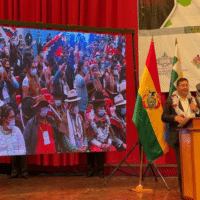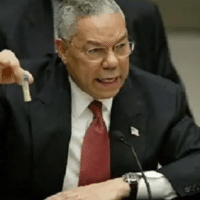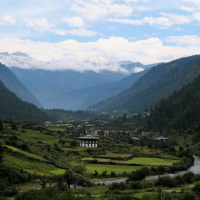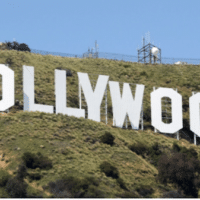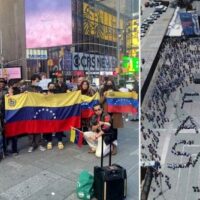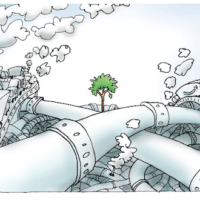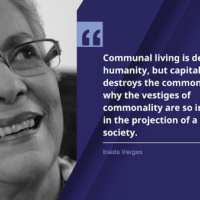-
Mumia Abu-Jamal: Militant journalism from behind enemy lines
Mumia Abu-Jamal has spent nearly 40 years unjustly imprisoned after he was framed and convicted of killing a white police officer in Philadelphia.
-
A different sort of truth
In the novel released this year, Mohamedou Ould Slahi offers a glimpse of the world he created to escape Guantanamo Bay Detention Camp, writes Alexander Hartwiger.
-
Luis Arce: An anti-imperialist climate agenda
Luis Arce Catacora: President of the Plurinational State of Bolivia Speech
-
‘State terrorism’: Alfred de Zayas on Alex Saab kidnapping
“’Lawfare’ is a modern epidemic. In the past, governments did what they wanted and got away with it. Today they attempt to throw a cloak of legality over their abuse of extradition treaties and subvert the administration of justice in the process,” wrote the historian.
-
‘Let’s put a wrench in things now’
Ten thousand John Deere workers in Iowa, Illinois, and Kansas launched an open-ended strike October 14.
-
Cinematic time and the accumulation of ecosocial crises
In his essay, researcher and filmmaker Alejandro Pedregal traces back to the early days of cinema. The new art form emerged during a capitalist era which had fundamentally altered our perception of time.
-
Former U.S. State Secretary Powell dies of COVID-19 complications
In Feb. 2003, he claimed Iraq had weapons of mass destruction. The war against this nation began six weeks later. In 2005, a official report acknowledged his claim was “dead wrong.”
-
Why do bosses keep trying to kill us?
Wittenoom is an abandoned town in the desert north of Perth. Once, it had a population of almost 1,000, making it the biggest town in the Pilbara. Now, it’s been removed from maps and cut off from all essential services, to stop people from visiting.
-
Narrative traps in India’s decision-making
Any Indian would know that powerful narratives envelop India’s deeply troubled relationships with Pakistan and China. The dominant narratives have become the means through which successive governments strove to assert values and identities.
-
Build back better Legislation: new Keynesianism or neoliberal Public Relations stunt?
It is imperative that the left, particularly left forces representing Black and nationally oppressed peoples, employ a materialist, class analysis as the lens and framework to inform their critique of the BBB legislation.
-
Division over IATSE deal as members organize Wildcat walkouts
Yesterday the leadership of IATSE announced that they had reached a tentative agreement with the Alliance of Motion Picture and Television Producers (AMPTP) that will avert a potential strike set to begin at midnight tonight.
-
The U.S. flies Alex Saab out from Cabo Verde without court order or extradition treaty
On October 16, Colombian businessman and Venezuelan Special Envoy Alex Saab was in practical terms kidnapped for the second time, first by Cabo Verde under pressure from Washington, and now by the U.S., in flagrant violation of international law.
-
A City Hall whodunit: what economic and political forces are responsible for climate change?
After a summer of record heat waves, droughts and forest fires, dangerous hurricanes and floods, and melting glaciers and permafrost, the scientific explanations for the climate crisis have gained wider support.
-
[BREAKING] Venezuelan Government envoy Alex Saab extradited to the United States
The Maduro administration blasted the contractor’s “kidnapping” and suspended dialogue with the US-backed opposition.
-
Globalization and its big data: the historical record in financial markets
In the 19th Century, “hypothecations” provided investors with valuable information on sovereign fiscal resources.
-
The curious case of Haitian pigs and Canadian imperialism
Pigs and Canadian imperialism. Most people would have difficulty understanding the connection. But for many Haitians the relationship is a historical memory.
-
The imprint of an insurrectional past: a conversation with Iraida Vargas and Mario Sanoja
Two eminent anthropologists talk about Venezuela’s history and its relation to the present.
-
How emerging markets hurt poor countries
Financial globalization was supposed to spur development. Instead, it transfers money to the global North and exacerbates existing inequalities.
-
Cryptocurrency: a new and dangerous climate disruptor
The get-rich-quick scheme, banned in China and elsewhere, is invading U.S. communities unchecked, posing as an “equalizing, democratizing” currency. It’s not.
-
U.S. writes Belarus into its familiar regime-change script
The primary reason the U.S. government opposes the Lukashenko administration is not its authoritarianism, real as that might be. Instead, Lukashenko’s steadfast refusal to privatize state assets, join NATO, or open the country up for foreign exploitation are Washington’s principal objections.



